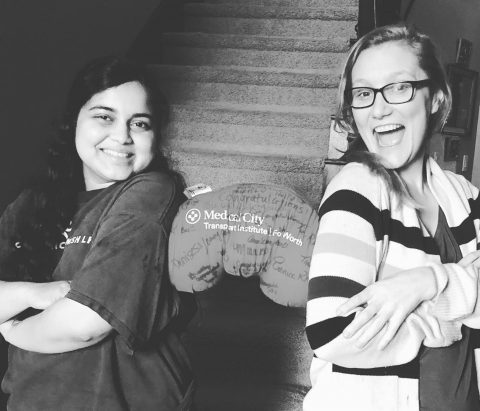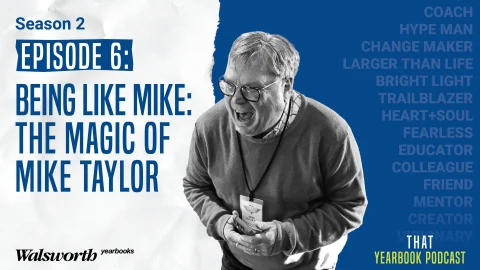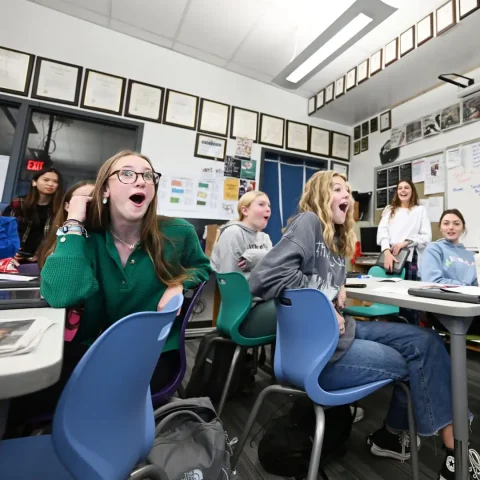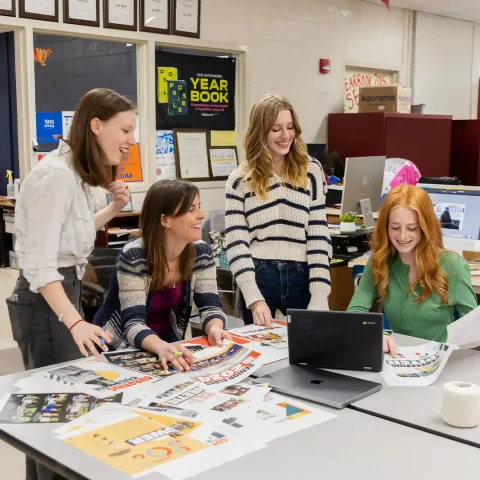Participation in scholastic journalism may have saved Neelam Bohra’s life. At 19 years old, the freshman University of Texas student started experiencing severe health issues and was diagnosed with an autoimmune disease that attacked her kidneys. She needed a transplant and found a donor in Leah Waters.
Bohra and Waters shared their story with host Jim Jordan on Yearbook Chat with Jim. You can find it at walsworthyearbooks.com/podcasts or wherever you listen to podcasts.
The Connection
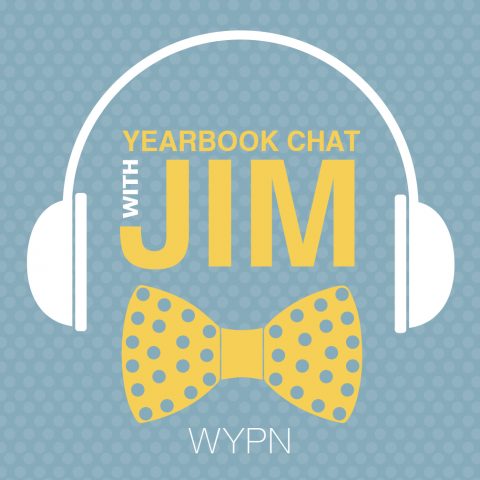 Waters is the journalism educator at Heritage High School in Frisco, Texas. She’s a CJE and state director for the Texas Association of Journalism Educators. Her involvement in the Texas journalism community meant she was already familiar with Bohra’s name. Bohra is a talented writer – you can read her account of her illness and transplant on her blog – and had been a star in the high school newspaper and yearbook circuits.
Waters is the journalism educator at Heritage High School in Frisco, Texas. She’s a CJE and state director for the Texas Association of Journalism Educators. Her involvement in the Texas journalism community meant she was already familiar with Bohra’s name. Bohra is a talented writer – you can read her account of her illness and transplant on her blog – and had been a star in the high school newspaper and yearbook circuits.
“I had heard Neelam’s name because I do judging for certain contests,” Waters explained. “And when you win everything, your name gets circulated around,” she joked.
Waters first became aware of Bohra’s need when TAJE was looking for someone to create some promotional videos for them. Bohra’s high school adviser, Alyssa Boehringer, CJE, of McKinney High School in McKinney, Texas, is part of the organization. When someone floated Bohra’s name as a candidate to do the work they needed, Boehringer filled everyone in on her illness. She wasn’t promoting Bohra’s need for a donation, only filling the group in on the situation.
“I think Leah asked a couple of questions that night, about what it was like, but it was a few days later when she sent another text message asking what was Neelam’s hospital. And that’s when my ears went up,” Boehringer said. At that point, Waters and Bohra had never even met.
“She just saw a kid in need and said, ‘Hey, I can do that.’ Can you believe it?” Boehringer said. “Leah was completely, selflessly willing to do this without much hesitation at all.”
Waters filled out the donation form the night she found out about Bohra’s need and had a blood test within a few days.
“I felt like there was a kid drowning in the ocean and I was the only one on the shore at the time,” Waters said. “I just reacted. I felt like there was this urgent need to help and so I did. Yes, someone else could have come along at some point and helped. But I also thought if everyone thought that way, a kid might drown before you got to them.”
The testing confirmed Waters was a match.
The Donation
Once the transplant committee approved the match, Waters was allowed to tell Bohra about it. So she sent an email.
“That day was awesome,” Bohra said. “I actually didn’t check my email – Ms. Boehringer told me to check my email.”
She followed her teacher’s instructions and found an email from Leah Waters. She didn’t know the name, but the contents of that email were life changing.
“I still remember reading it and crying, then reading it again, then reading it out loud,” she shared. “It was a really amazing moment.”
The first time they met face-to-face was just days before the surgery, less than two weeks from when Waters sent the email, and six weeks after Bohra’s diagnosis.
The transplant has been successful so far. Waters missed about a week of classes but is doing fine now, and Bohra has been cleared to return to the University of Texas.
The Relationship
Although they didn’t know each other before, Bohra and Waters have developed a close relationship.
“Neelam and I, although the kidney brought us together we spend a lot of our time talking about writing. So that’s kind of cool,” Waters shared. They share their work with each other for critique.
They’re both writers and journalists and have been using writing to process the experience.
“She has inspired me to write a lot more about this than I would have, because a huge part of me wanted to try to forget about it and lock it away in this corner in my head. It’s much healthier to process things,” Bohra said.
Bohra wrote a blog post about her experience when she got sick, and Waters said reading that post is what solidified the decision to donate. After surgery, Bohra wrote another post about recovery and how lucky she was to get a donation and not have to do dialysis.
Waters admits she didn’t really think, just acted, so writing helped her process what she hadn’t already. She’d like to say something inexplicable made her donate, but writing won’t let her fall back on that.
“As a writer, you can’t write that ‘something inexplicable made you do something,’ because if I can’t explicate my reasons why, how else is anyone else going to understand?” Waters said. “I am writing to help myself understand.” She’s currently working on a piece that will be published in the Dallas Morning News.
Hear more
You can hear Bohra and Waters share their experience in their own words on Yearbook Chat with Jim. They also share more about their individual backgrounds. Bohra’s former teacher, Alyssa Boehringer, even shares a little bit about the role she played in bringing these two together. Listen at walsworthyearbook.com/podcasts or wherever you listen to podcasts, including Spotify, Stitcher and iTunes.
If you were inspired by their story, you can learn more and support the National Kidney Foundation at kidney.org.

